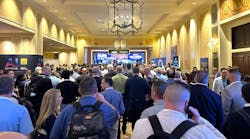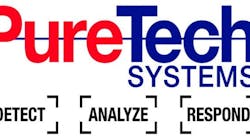Target on RMR
The ESA Leadership Summit kicked off yesterday and already a common theme is emerging: finding new ways to generate recurring monthly revenue (RMR).
Updated this year with a new focus on peer-to-peer activities and breakout sessions, some 200 registered guests were logged for the event this week, which includes boardroom presentations and product showcases with one-on-one meetings and general sessions and other sessions designed to address the systems integrators needs to generate more revenue through systems installations. According to AE Ventures, which produces the event for the Electronic Security Association, there were many new faces signed up and in attendance, a further indication that the industry continues to grow, and with more from the IT side of the business, as well as those from the A/V portion, finding interest in tying it all together with security.
A Best Practices roundtable session had the room abuzz and yielded some interesting ways to do business better, including:
- Moving to smaller work vehicles in an effort to thwart rising energy costs and become more cognizant of ‘green’ contracting strategies;
- Using social networking sites to broadcast to a wider audience; as well as hiring an intern to work the sites at a much lower compensation rate than other workers;
- Finding IT and networking staff at job fairs where new employees can be garnered at considerably lower costs;
- Offering various incentives for customers looking at managed services and managed access; and
- Back to basics marketing, such as offering video clips from devices such as Videofied to peak municipalities and others interests in such plans.
Luncheon speaker was Michael Barnes, principal at Barnes Associates near St. Louis. Barnes who spoke about the importance of systems integrators and other companies becoming well-versed in specific vertical markets and how that expertise can lead to a higher valuation of the company and its RMR.
“What we have found overall is that a company with a high degree of specialization in vertical markets generally got a higher return on investment,” Barnes told the audience. “The focus yields better results when the company decides to sell,” he said.
Barnes added that a strong vertical market focus also helped companies in the following areas:
- Greater operating efficiencies,
- Crisper and more focused business culture,
- More defined value proposition,
- Clearer competitive landscape,
- Better narrative and easier to sell,
- Lower attrition rates.
“The key to success in any vertical market is to know what you are good at,” Barnes said. “The best performing companies have technicians and personnel who are fully immersed in that vertical and know it well,” he added. – Deborah L. O’Mara, editor, SD&I magazine

